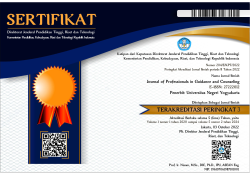Critical analysis of KIPAS counseling model: Professional counseling crisis phenomena by counselor in Indonesia
Abstract
The quality of counselor performance can be seen from the implementation of professional counseling that is complete and effective. On the other side, Indonesian counselors are struggling with Permendikbud No. 111 of 2014, which provides professional services at a ratio that approves a counselor serving 150 students. This makes it necessary for a counseling model that has a simpler, more concise procedure and immediately shows effective results accompanied by a load of cultural awareness in the implementation process. What has happened so far is that Indonesian counselors are still trapped in counseling models born from Western philosophy, not in accordance with the cultural, social and cultural diversity of Indonesia which often results in incomplete counseling processes. KIPAS counseling is a model of local culture-based counseling, making it effective to be applied in Indonesian counseling services. The reality that appears at this time is, the need for the amount of completion of the counseling implementation completely and effectively and is full of cultural understanding as the point of view of Indonesian counselors. This article uses a qualitative approach with a critical analytical method that aims to criticize the KIPAS counseling content that is reviewed based on the reality of the implementation of professional counseling by counselors in
Keywords:professional counseling, KIPAS counseling model, counselor
Keywords
Full Text:
31-39References
Blocher, D.H. (1968). Counselor Education: Facilitating the Development of Helping Person. Boston: Houghton Mifflin Company.
Blocher, D.H dan Biggs, D.A. (1986). Counseling Psychology in Community Settings. New York: Springer Publishing Company.
Blum, D.J dan Davis, T.E. (2010). The School Counselor’s Book of Lists. 2e. United Stated of America: John Willey and Sons.
Comier, W.H. dan Cormier, L.S. (1985). Interviewing Strategies for Helpers: Fundamental Skills Cognitive Behavioral Interventions. Monterey, California: Brooks/Cole Pusblishing Company.
Ellis, M. V. (2001). Harmful supervision, a cause for alarm: Comment on Gray et al. (2001) and Nelson and Friedlander (2001). Journal of Counseling Psychology, 48, 401–406.
Gibson, R, L. & Mitchell, M, H. (2010). Bimbingan dan Konseling (Alih Bahasa oleh Yudi Santoso). Yogyakarta: Pustaka Belajar.
Gysbers & Henderson. (2006). Developing and Managing (Your School Guidance and Counseling Program). USA: American Counseling Association.
Glading, ST. (2009). Cunseling a Comprehensive Profession. New Jersey.
Harko, R., & Ifdil, I. (2017). Analisis Kritik Terhadap Model KIPAS: Konseling Intensif rogresif Adaptif Struktur. Jurnal Konseling dan Pendidikan: Vol 5 No. 2, Hal 109-117.
Kimberly A. Vess dan Duane A. Halbur. (2003). Character Education: What Counselor Educators Need To Know. University of North Carolina at Greenboro.Nc.
Khairul Bariyyah1,Devi Permatasari, Ch. Erghiezha N.I.K. (2016). Tingkat Kesadaran Multikultural dan Urgensinya Dalam Bimbingan Dan Konseling. UNIKAMA. Journal Counseling Indonesia, 3(1), 31-39. http://www.ejournal.unikama.ac.id.
Kawijoarto. (2015). Program Pelatihan untuk Mengembangkan Keterampilan Konseling Lintas Budaya Bagi Guru Bimbingan dan Konseling. Universitas Pendidikan Indonesia. http:// www.repository.upi.edu.com perpustakaan.upi.edu. accessed on: 2017, May 1.
Kementerian Pendidikan dan Kebudayaan Indonesia. 2014. Permendikbud No. 111 Tahun 2014 Tentang Bimbingan dan Konseling.
Lasan, B. B. (2014). Konselor Sekolah: Tinjauan dan Upaya Profesionalisasi. Malang: Elang Mas Bekerjasama dengan Jurusan Bimbingan dan Konseling, Faklutas Ilmu Pendidikan, Universitas Negeri Malang.
Mappiare-AT, A. (2013a). Martabat Konselor Indonesia dalam Falsafah dan Kinerja Model KIPAS: Konseling Intensif Progresif Adaptif Struktur. Prosiding Kongres XII, Konvensi Nasional XVIII ABKIN dan Seminar Internasional Konseling, Denpasar Bali, 14-16 November 2013. Denpasar: Panitia Kongres XII, Konvensi Nasional BK XVIII.
Mappiare-AT, Andi. (2013). Penguatan Layanan Bimbingan Melalui Model Konseling Intensif dan Progresif yang Adaptif terhadap Struktur (KIPAS). Proceeding: Makalah Sumbangan Seminar Internasional. Universitas Negeri Medan.
Mappiare-AT, A. (2013c). Tipe-tipe Metode Riset Kualitatif: untuk Eksplanasi Sosial Budaya dan Bimbingan Konseling. Malang: Elang Mas bersama Prodi Bimbingan dan Konseling Fakultas Ilmu Pendidikan Universitas Negeri Malang.
Mappiare-AT, Andi. (2013). Martabat Konselor Indonesia dalam Falsafah dan Kinerja Model KIPAS: Konseling Intensif Prpgresif Adaptif Terstruktur. Prosiding: Kongres XII, Konvensi Nasional XVIII Asosiasi Bimbingan dan Konseling Indonesia (ABKIN) dan Seminar Internasional Konseling. Bali: UNDIKSA.
Mappiare-AT, A. (2017). Meramu Model Konseling Berbasis Budaya Nusantara: KIPAS (Konseling Intensif Progresif Adaptif Struktur). Pidato Pengukuhan Jabatan Guru Besar dalam Bidang Ilmu Budaya Konseling pada Fakultas Ilmu Pendidikan. Disampaikan pada Sidang Terbuka Senat Universitas Negeri Malang at the date of 2017, 28 February.
Schmidt, J. J. (2003). Counseling ins School: Essential Servce and Comprehensive Programs. 4th.ed. Boston: Allyn and Bacon.
DOI: https://doi.org/10.21831/progcouns.v1i1.30238
Refbacks
- There are currently no refbacks.

This work is licensed under a Creative Commons Attribution-ShareAlike 4.0 International License.
Supervised by:

Our journal indexed by:
ISSN 2722-6581 (print) || ISSN 2722-2012 (online)
ProgCouns Stats









